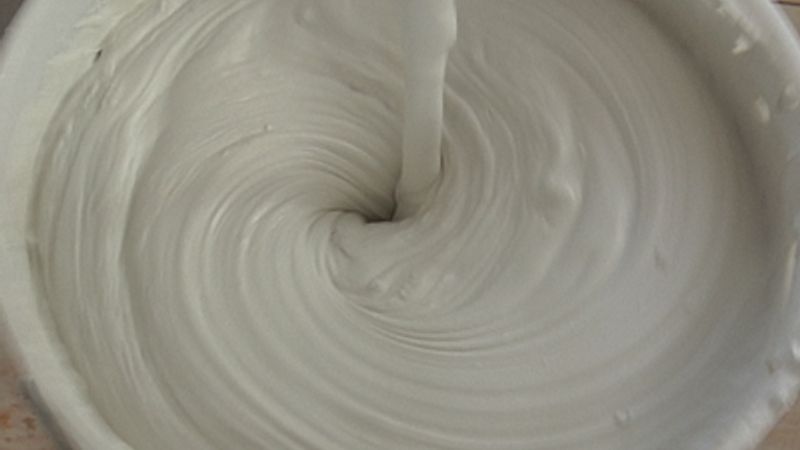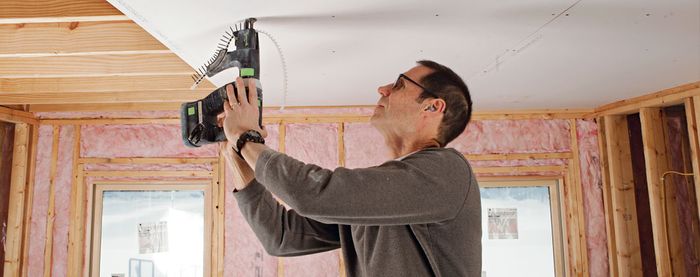How to Choose and Mix Ready Mix Joint Compound
Patrick McCombe explains how to choose ready mix mud and how to mix it so it goes on easily and spreads smooth.

Ready mix joint compound comes in a variety of formulas including all purpose, lightweight, and with dust control. In this Building Skill we’re going to talk about ready mix mud and I’ll show you how to mix it so it goes on easily and spreads smooth.
Here are some qualities to consider when choosing between types of drywall mud:
All-purpose joint compound
- Sands to a smooth finish
- Resists dents and scuffs
- Is the heaviest type of compound
Lightweight joint compound
- Is about 20-lb. less per 5-gallon pail than regular compound
- Sands with less effort
- Doesn’t sand as smooth
- Scratches easily
Dust control
- Sheds heavier dust when sanding, which tends to fall to the floor instead of staying airborne
There are a couple of common ways to mix compound:
- A heavy-duty drill fitted with a paddle or auger style mixing attachment is the easiest and most efficient method
- A large “potato masher” mixer works if you don’t have a heavy-duty drill, but it requires more physical effort
More Drywall Articles and Videos
Video: Hanging Drywall |
Taping and Mudding Inside Corners |
How to Install and Finish Drywall |
Elegant Wainscot From Drywall Scraps |





View Comments
A publication like Fine Homebuilding should always stand for doing things better. That's why I'm a little disappointed to find this video on ready-mix compound when setting-type compounds are so superior and SHOULD be what you promote. Granted, ready-mix is convenient being already mixed and coming in its own bucket. Beyond that, it sucks. It's slow to dry, very soft and easily damaged, and it shrinks as it dries, resulting in cracking, tape separation, and the need for more coats.
I can't begin to tell you how many "professional" drywall jobs I've fixed over the years that were done using conventional ready-mix and tape. I switched to lightweight setting-type compound many years ago and have converted everyone who has ever worked for me to the product. It is as easy to sand as all-purpose ready-mix, but offers a number of advantages. Firstly, it sets chemically, so it begins to harden even before the water in it dries. This means that it becomes firm to the touch (and thus impervious to pedestrian damage) sooner than ready-mix. Since you mix it yourself, you can also vary the consistency to create a thicker filler coat followed by thinner finsih coats. You can do this even as the earlier coats are still wet. In this way, I can put a first coat of heavier mud on a seam, then, as it firms-up, spray it with water and apply a thin finish coat to feather it out and fill pinholes. Once all that is dry, a very quick sanding and I'm ready to prime.
Since the product doesn't really shrink, it holds better to tape. You can skip the 3 step process for taping an inside corner when you use setting-type compound. Now, a lot of people try to do that with ready-mix and it results in the tape separating from the compound. But with setting-type, you can bed the tape, then build the mud right over it without waiting between coats.
For all these reasons, my crews know never to buy the ready-mixed junk.
Thanks for the comments, Dave. I agree with you, setting-type compound is great, but some folks feel more comfortable with ready-mix. And three coats of setting-type compound is overkill for all but the most-rushed or smallest jobs.
About the same time we shot this video, we also did a video segment on setting-type compound that discusses the advantages you mentioned in your comment. The video should be available soon.
Stay tuned.
Patrick McCombe
Associate Editor
this article sheds light on a mis understood area
Benjamin Marcus Raucher